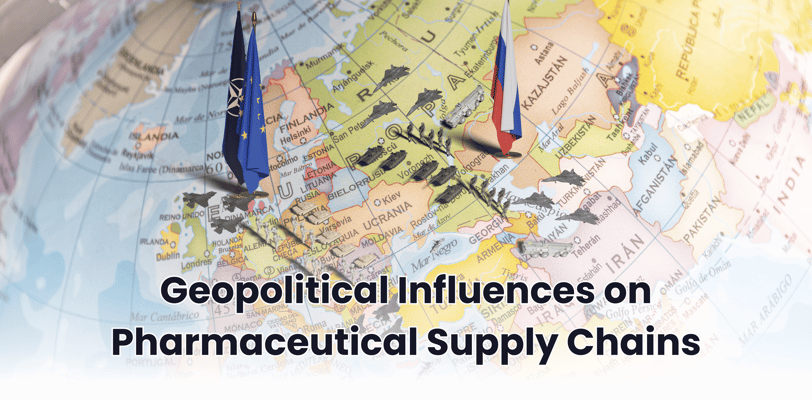Geopolitical Influences on Pharmaceutical Supply Chains: Challenges and Strategies
In today’s interconnected world, pharmaceutical supply chains are highly vulnerable to geopolitical influences. Trade policies, international conflicts, and economic sanctions all play a crucial role in determining the efficiency and stability of drug exports and imports. This blog explores how geopolitical events impact pharmaceutical supply chains and the strategies companies can adopt to mitigate risks.
1/30/20252 min read


The Geopolitical Landscape and Its Impact
1. Trade Policies and Tariffs
Governments worldwide regulate pharmaceutical exports and imports through trade policies and tariffs. Changes in tariff structures can increase costs, disrupt supply chains, and make it harder for companies to maintain a steady flow of medicines. For instance, the ongoing trade tensions between the U.S. and China have led to increased scrutiny on active pharmaceutical ingredients (APIs), which are largely sourced from China and India.
2. International Sanctions and Export Restrictions
Economic sanctions imposed on certain countries, such as Russia and Iran, have significantly restricted access to essential medicines and APIs. These sanctions create barriers for pharmaceutical companies looking to export to or source raw materials from affected regions. Companies must navigate complex regulatory environments to ensure compliance while maintaining supply chain efficiency.
3. Global Conflicts and Supply Chain Disruptions
Geopolitical conflicts, such as the Russia-Ukraine war, have had significant implications for pharmaceutical supply chains. The disruption of transportation routes, energy shortages, and economic instability in conflict zones affect drug production and distribution. The pandemic further exposed vulnerabilities, highlighting the need for diversified supply sources.
4. Nationalism and Drug Supply Prioritization
Countries often prioritize domestic pharmaceutical production over exports during times of crisis. For example, during the COVID-19 pandemic, several nations imposed export bans on critical drugs and medical supplies, leading to global shortages. Such protectionist policies force companies to rethink their sourcing strategies and explore alternative markets.
Strategies to Overcome Geopolitical Challenges
1. Diversification of Suppliers
To mitigate risks associated with geopolitical instability, pharmaceutical companies should diversify their supplier base. Relying on multiple sources for APIs and raw materials can help prevent disruptions due to trade restrictions or political tensions.
2. Strengthening Regional Manufacturing
Many countries are now focusing on regional pharmaceutical production to reduce dependency on foreign suppliers. Investing in local manufacturing facilities can help ensure a stable supply chain and minimize exposure to international trade conflicts.
3. Enhancing Regulatory Compliance
Navigating international regulations is crucial for pharmaceutical companies operating in a geopolitically sensitive environment. Maintaining compliance with export and import laws, sanctions, and tariff requirements ensures smooth operations and minimizes legal risks.
4. Adopting Digital Technologies
The integration of digital technologies such as blockchain, AI-driven supply chain analytics, and real-time tracking can enhance transparency and efficiency in pharmaceutical logistics. These technologies help companies respond proactively to geopolitical disruptions.
Conclusion
Geopolitical influences on pharmaceutical supply chains are complex and ever-evolving. Companies must adopt proactive strategies, including supplier diversification, regional manufacturing, regulatory compliance, and digital transformation, to mitigate risks. By staying ahead of geopolitical trends, the pharmaceutical industry can build more resilient supply chains and ensure global access to essential medicines.
Are you looking for more insights on global pharmaceutical exports? Stay updated with the latest trends by following our blog!
